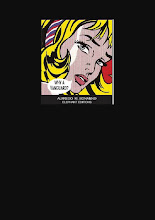One million or five million people come out into the streets. Numbers apart, is such an event of any importance? No, I don’t think so at all.
Far from the old Sorelian myth, a general strike is not in itself a response by the exploited to the intentions of Power.
It is far more likely to mean something else. Let us see what.
First of all it is a sign of the capacity of the personalist politics presently being regenerated to bring millions of people into the streets. An instrument of political pressure therefore, in the hands of possible new power bases to co-opt the old or take their place. Nothing would change. From the point of view of the management of public spending—by no means of secondary importance—there can be no solution other than that (moreover only provisional) of dipping into the coffers of the rich, and not just those of high profile, but also the ones who keep themselves hidden. Can a political class, no matter how new and alien to concessions from its own pockets, succeed in doing as much? No it can’t. So what are these millions of people in the streets actually asking for? To what power games are they wittingly or unwittingly lending themselves?
It is clear that there is no real collective presence in the various regions in Italy that have been loosely united in a general strike, so we cannot talk as though it were related to one individual or a group of individuals. But something needs to be said all the same.
The main composition of this presence, although it is not uniform or homogenous, is that of the waged classes who are afraid of losing their jobs, those already excluded (and destined to perennial unemployment), the youth element (aspiring to guaranteed jobs, and which they will continue to do), pensioners (who see themselves as deprived of the few rights they had), in support of the unions and the parties of the left who are desperately seeking a place within the opposition, but to no avail. And the latter might get this possibility, with the good shopkeeping common sense of all those who believe that things can be put right (first with Berlusconi and now without him). And having brought Fini’s fascists into government along with Bossi’s idiots and Berlusconi’s technocrats and image manipulators, they are now regretting it, and trying to apply pressure by demonstrating their dissent. That might all be useful to the new opposition when they manage to find their own identity. But how can it mean anything in terms of the reality of things which could, and yes, radically should, be changed?
By rendering service to politicians who have been thrown out, making out that they deserved so much fuss? Of course not. The means would have to be quite different.
Restricting the question to the streets, because that is what we are talking about, the outcome, or at least the preoccupations at government level, would have been quite different if they had found themselves faced with situations such as in the days of piazza Statuto, or Reggio Emilia [where demonstrations turned to rebellion, resulting in the police firing into the crowd]. Not that mass violence in itself—in the form of clashes with the police—were the main means, so the results were predictable even then. What we are saying is more complex. The message contains its own destiny. As a method, the demonstration on its own has no future, because it merely aims to put pressure on the government for a change in the political class in power. The direct clash is a different method altogether, even if it can also be blocked, recuperated or defeated with the guile of promises or brute repression. But that is another question, it opens up a different kind of rupture.
It would certainly be more difficult for the unspeakable Berlusconi to recuperate with a smile on his face.
He would have to roll his sleeves up. And then, one thing could lead to another, and so on...
[Original title: Il significato di un evento insignificante, in “Canenero”, no. 1, 28 October 1994. English translation by Jean Weir published in "Let's destroy work, let's destroy economy", Elephant Editions, London.]
skip to main |
skip to sidebar

Some writings of Alfredo Maria Bonanno in English, or almost

Alfredo Bonanno was arrested on October 1st 2009 in Greece, accused of concourse in robbery. With him, anarchist comrade Christos Stratigopoulos.
Here are a few translations and part translations of a small portion of Alfredo's writing. This is a work in progress, many of the translations are as yet incomplete. Open links to find more of Alfredo's work.
Alfredo Bonnano Released
Nov. 22 Alfredo Bonnano was sentenced to 4 years imprisonment (which practically means that with the time served so far and the fact that he is over 70years old HE IS RELEASED
Christos Stratigopoulos (who took responsibility for the action)
was sentenced to 8 years and 9 months with the Greek law will probably be released at the end 2011
BY ANY MEANS NECESSARY
LINKS
click on any of these labels to read text
- "Community" sickness
- 1981 - Editorial
- A Critique of Syndicalist Methods
- A few notes on Sacco and Vanzetti
- A few notes on the revolutionary movement in Italy
- A little man in Singapore
- A million jobs
- A question of class
- Affinity
- After Marx autonomy
- Albania Laboratory of Subversion (Introduction)
- Anarchism and the national liberation struggle
- Anarchists and action
- AND WE WILL ALWAYS BE READY TO STORM THE HEAVENS AGAIN (Against amnesty)
- ANTI-INSTITUTIONAL MOVEMENT
- Are we modern?
- Armed Joy
- ARMED STRUGGLE. SOME REFLECTIONS.
- Autonomous base nuclei
- beyond syndicalism
- Beyond workerism
- But what is the imaginary?
- Class War
- Comiso - Organizational document of the self-managed leagues
- Considerations on illegality
- Dissonances (Introduction)
- Elephant Editions 1986
- Excluded and included
- Farewell to claiming
- Feral Revolution (Introduction)
- FICTITIOUS MOVEMENT AND REAL MOVEMENT
- For an Antiauthoritarian Insurrectionist International - Proposal for a debate
- From riot to insurrection
- From the centre to the periphery
- Good technology
- Guerilla Extraordinary
- Habits and idols
- Hegel
- I know who killed chief superintendent Luigi Calabresi
- Illegality
- Illness and capital
- Informal organisation
- Insurrection
- Internationalism
- Introduction to Sabate
- Introduction to Anarchism and Violence
- Introduction to Bratach Dubh English edition of Malatesta's Fra Contadini
- Introduction to Insurrectionalist Anarchism
- Introduction to Strange Victories
- Introduction to The Conquest of Bread
- Involuntary aspects of voluntary work
- Let's destroy work
- LET'S DESTROY WORK. New introduction
- Let's keep our feet on the ground please
- Lightening Conductors and Stand-ins - more shots of non-news
- Lightning Conductors and Stand-ins
- Lightning Conductors and Stand-ins (cont.)
- Locked up
- Looking forward to self-management
- Loss of language
- More on internationalism
- National Liberation Struggle
- nineteen years on
- No more crises
- Non-news about drugs
- Non-news about racism
- Ode to the Uniform
- On Feminism
- One's life on the line
- Order and chaos
- Otto Ruhle (Introductory Note)
- OUR ROLE IN THE PRESENT CONFLICT
- Palestine mon amour
- Pantagruel anarchist review
- Pinelli
- Prison and Prisoners’ Struggles - Introduction
- Propulsive Utopia
- Quality and the factory
- Restructuring Capital and the new democracy
- Revolution - Violence - Antiauthoritarianism
- REVOLUTIONARY VIOLENCE
- Science and the social revolution
- Self-management
- Severino Di Giovanni in Argentina 1923-1931 by Osvaldo Bayer
- Social banditry
- SOME NOTES -
- Space and Capital
- Stirner
- Stop the City? From information to attack
- Strategy and Methods
- Streamlined production
- The "end" of the crisis
- The aesthetics of anarchism
- The anarchist tension
- The area of autonomy and the anarchist movement in Italy
- The armed wing of science
- The Cruise missile base at Comiso can be prevented
- The ethical bank
- The insurrectional project
- THE LANGUAGE OF TECNICS -
- The logic of insurrection
- The moral split
- THE NECESSARY DESTRUCTION -
- The priority of practice
- The refusal of arms
- The revolutionary project
- The revolutionary struggle
- The significance of an insignificant event
- The struggle for self-managed social space
- The tyranny of weakness
- The whole and the part
- The young in a post industrial society
- Theory and action
- Towards anarchist antimilitarism
- TOWARDS THE GENERALISATION OF ARMED STRUGGLE
- TRANSFORMATION IN THE WORLD OF WORK AND SCHOOL -
- TRUTH -
- Unemployment in Italy - How come everything doesn't explode?
- Untitled
- Violence and non-violence
- What are anarchists
- What can we do with anti-fascism?
- Why a vanguard?
- Why Insurrection
- World domination in a few words











